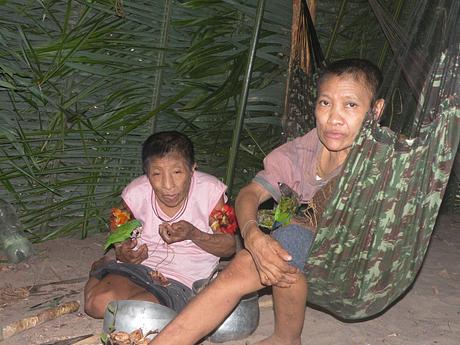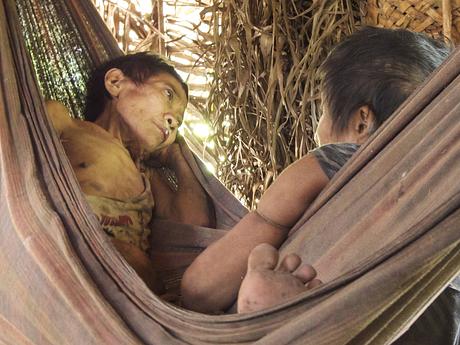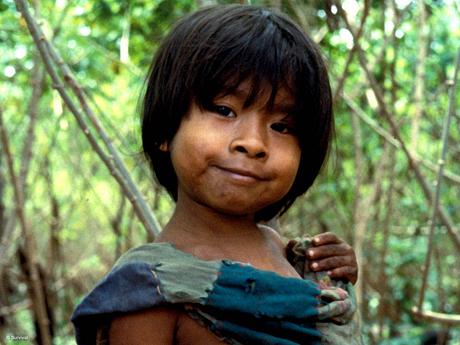Amazon Indians take one look at “us” – and head back into the forest
September 8, 2016
 © Madalena Borges/CIMI-MA
© Madalena Borges/CIMI-MAThis page was last updated in 2016 and may contain language which is now outdated.
Two uncontacted Indians from the Amazon have completed an extraordinary journey back to their forest home, having been helicoptered to a large city on the brink of death.
Jakarewyj and Amakaria, uncontacted hunter-gatherer nomads from the Awá people, were forced to make contact with settled Awá in 2014, as they were surrounded by loggers and had contracted flu and tuberculosis to which they had no resistance.
The sisters, together with Jakarewyj’s son Irahoa, had been on the run for years, chased from their land and hiding from the loggers whose “screaming” chainsaws terrified them. "We were scared… We were trapped,” Irahoa told Survival. The rest of their group had been wiped out.
The Awá’s allies in Brazil, and Survival supporters around the globe, demanded action and Brazil sent a team of medical experts to intervene. Jakarewyj and Amakaria were emergency air-lifted to the state capital where they eventually recovered.
Now both women have decided to return to their uncontacted lives in the forest, despite the ongoing threat of loggers. Contacted Awá have said that the sisters did not like food or medicines they were not used to, or the heat of the village, and that they always spoke fondly of their forest.
It is understood that they covered their tracks after going back so they could not be followed.

Rosana Diniz from the Brazilian Indigenous rights organization CIMI said: “We must respect their choice to return to their forest as that is what they want. Although it’s dangerous, it’s the place they know and love."
Uncontacted tribes are the most vulnerable peoples on the planet. Whole populations are being wiped out by genocidal violence from outsiders who steal their land and resources, and by diseases to which they have no resistance. However, where their rights are respected, they continue to thrive.
Many contacted Awá have said that they preferred life before contact. Wamaxua, a recently contacted Awá man said: “When I lived in the forest I had a good life. Now if I meet one of the uncontacted Awá in the forest I’ll say, don’t leave! Stay in the forest… There’s nothing on the outside for you.”
Despite this some outsiders, such as American anthropologists Kim Hill and Robert Walker, continue to advocate “controlled contact” expeditions to forcibly contact tribal peoples and integrate them into the mainstream of society.
However, others have interpreted the women’s decision as a clear indication that many not only prefer life in the forest as it was before contact, but also reject many of the so-called benefits of “progress” and “civilization.”
Survival’s Director Stephen Corry said: “We’re very pleased that Jakarewyj and Amakaria have recovered and been able to make their own decision about how they wish to live. Initiating contact must be uncontacted peoples’ choice alone. Those who enter uncontacted tribes’ territories deny them that choice. The sisters’ journey and determination leaves no place for doubt: Uncontacted tribes are fighting ceaselessly to live on their land, and it’s up to governments and all humanity to ensure they can do so.”
Note: Information from CIMI




